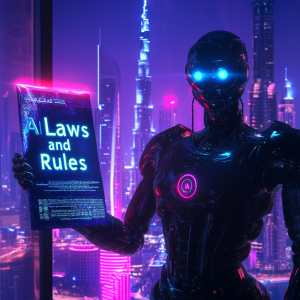What if your next law wasn’t drafted by a human, but by an algorithm? The United Arab Emirates has just made headlines as the first country in the world to officially enlist artificial intelligence in writing its legislation. This bold move sits at the crossroads of tradition and innovation, blending Sharia-influenced law with cutting-edge technology. But can a machine truly understand justice, or is this just high-speed bureaucracy in a shiny new outfit? In this article, we explore what this means for law, AI, and the future of governance.
Understanding the UAE’s Legal Landscape
The United Arab Emirates (UAE) is a federation of seven emirates, each with its own ruler, that united in 1971 to form a single country under a federal constitution. This federal structure means governance operates on two levels: federal (central government institutions) and local (the individual emirates’ own authorities). Legislative and judicial powers are shared in a unique way – some emirates fully participate in the federal system, while others retain independent control over certain matters. For instance, Dubai and Ras al Khaimah maintain their own judicial frameworks (courts and laws) in many areas, whereas emirates like Abu Dhabi, Sharjah, and others are more integrated into the federal court system. All emirates are represented in the UAE’s highest constitutional authority, the Supreme Council (comprised of the seven rulers), which along with the President and Prime Minister guides major national policies.
Sharia Law (Islamic law) is declared by the UAE Constitution as a primary source of legislation, and its influence permeates many aspects of the legal system. In practice, the UAE’s law is a blend: core personal matters like marriage, divorce, and inheritance for Muslims are governed by Sharia through dedicated Sharia courts, while most other domains are covered by civil statutes. The UAE follows a civil law tradition for its codified laws – heavily influenced by Egyptian codes and, by extension, French civil law – rather than Anglo-American common law. This means that legislation and written codes are paramount, and court precedents are not as binding as in common law jurisdictions (though important judgments can still guide future cases). At the same time, in recent years the UAE has shown flexibility by introducing common law elements in certain zones: for example, the Dubai International Financial Centre (DIFC) and Abu Dhabi Global Market have their own English-language courts based on common law principles, operating in parallel to the regular court system. This mixed approach – civil law merged with Sharia principles, and a dash of common law in special contexts – makes the UAE’s legal system uniquely hybrid.
It’s also key to note how laws are normally made in the UAE. The country does not have a fully elected legislature with binding powers in the way many Western democracies do. Instead, draft laws typically emerge from the Cabinet(executive branch) or specialized committees, and then a federal advisory parliament called the Federal National Council (FNC) reviews and suggests amendments. The FNC, however, has no power to veto or enact laws on its own – it serves a consultative role. Final approval of federal laws lies with the Supreme Council (the rulers) and the President. In essence, lawmaking in the UAE has traditionally been a top-down, technocratic process, albeit one that seeks expert input and alignment with Sharia and civil law norms. This centralized but consultative model perhaps set the stage for the latest innovation in UAE governance – handing some of the legislative drafting duties to an artificial intelligence.
A Bold Leap: AI Gets a Hand in Drafting Laws
In April 2025, the UAE stunned legal observers by announcing it would become the first country in the world to use artificial intelligence (AI) to draft, review, and amend its laws. In a Cabinet meeting led by Sheikh Mohammed bin Rashid Al Maktoum (UAE Prime Minister and Ruler of Dubai), ministers approved the creation of a new body called the Office of Regulatory Intelligence to spearhead this AI-driven lawmaking initiative. The idea is ambitious: an advanced AI system will be tasked with assisting in writing legislation, analyzing existing laws, and even suggesting new legal provisions or updates in real-time as society evolves.
How will this work in practice? The plan, as outlined by state media, is to build a massive unified database of UAE laws and legal resources that the AI can draw upon. This database will integrate all federal and local legislation, plus a wealth of legal data such as court rulings, regulatory procedures, and public service information. Essentially, the AI acts as a super-informed legal researcher and drafter combined: it can instantly cross-reference laws across emirates, check how regulations are applied on the ground, and flag inconsistencies or gaps. With this foundation, the AI system – powered by state-of-the-art language models – will generate draft texts for new laws or amendments. It won’t be operating in isolation, though; the Office of Regulatory Intelligence will oversee the AI’s work and coordinate with human officials at both federal and emirate levels.
According to UAE officials, the goals of this initiative are to dramatically speed up the legislative process and improve its precision. By automating the “heavy lifting” of legal analysis and first-draft writing, the government projects it can accelerate lawmaking by as much as 70%. What might have taken many months of human committee meetings, draft revisions, and inter-agency consultations could be done in a fraction of the time with AI assistance. “This new legislative system, powered by artificial intelligence, will change how we create laws, making the process faster and more precise,” said Sheikh Mohammed in announcing the program. In addition to saving time, the UAE expects to cut costs (potentially halving the expenses of drafting legislation, by some estimates) and even spur economic growth – projecting a boost to GDP by embracing AI and streamlining regulation. By 2030, the UAE believes this and related AI initiatives will help increase its GDP by 35% as it positions itself as a global hub for AI-driven innovation.
The AI legislative system is not intended to work in a vacuum or replace human judgment. In fact, part of the plan involves continuous human oversight and collaboration. The AI will propose draft laws or updates “regularly” as conditions change, but these proposals will be reviewed by human experts – including legal drafters, judges, and likely new AI ethics committees – before they ever become actual law. By monitoring how the AI drafts and the real-world impact of any AI-suggested laws, the Office of Regulatory Intelligence can refine the system over time. Sheikh Mohammed indicated the AI will “regularly suggest updates to our legislation,” making governance more dynamic and responsive. In other words, instead of waiting for a problem to wind through bureaucracy, the AI might flag emerging issues (say, a new type of digital transaction not covered by existing law) and recommend a fix on the fly. This constant feedback loop could ensure the UAE’s laws stay up-to-date with technological and social developments.
The technology behind this initiative hasn’t been described in minute detail publicly, but it builds on the UAE’s broader AI Strategy 2031 and earlier investments in AI governance. (Notably, the UAE appointed the world’s first Minister of Artificial Intelligence in 2017, Omar Sultan Al Olama, to signal its commitment to AI in government) The system likely uses large language models (similar to the engines behind GPT-type AI) trained on the UAE’s entire corpus of legal texts and possibly informed by global legal data. By training the AI on everything from the UAE’s civil and commercial codes to its Sharia-based personal laws, the government aims to ensure the AI’s output respects local legal principles and cultural values. There is also an emphasis on working with international research centers to adopt best practices and state-of-the-art techniques – meaning the UAE doesn’t want its AI lawmaker to operate in isolation from global developments in AI and law.
What truly makes the UAE’s approach groundbreaking is the scope of AI’s role. Other countries have certainly begun experimenting with AI in the legal realm – for example, some governments use AI tools to help with legal research, document translation, or simplifying jargon in public forms. The UK has trialed an AI system nicknamed “Red Box” to assist in drafting policy documents and reduce paperwork. The U.S. and various European countries are looking at AI to modernize their legacy IT systems or to flag inconsistencies in regulations. None, however, have officially given an AI platform such a direct hand in writing actual legislation – at least not to the extent of allowing draft laws to be initially composed by a machinemoneycontrol.com. The UAE proudly notes this move as a world-first: a leap from using AI in government to making AI a sort of junior co-legislator. As one analysis put it, “Governments around the globe are only experimenting with AI for enhancing efficiency, and none have gone as far as deploying it to suggest legal amendments,” making the UAE a test case for AI’s legislative potential.

Promises and Pitfalls of AI-Written Legislation
The UAE’s AI lawmaking initiative is bold and unprecedented, and it unsurprisingly comes with a mix of enthusiastic support and cautious skepticism. Let’s break down some of the key advantages the government is aiming for, as well as the concerns and potential drawbacks that legal experts and observers have raised.
Potential Advantages of AI in Legislative Drafting
- Faster and More Efficient Lawmaking: Speed is the headline benefit. An AI can sift through thousands of pages of statutes and case law in seconds and generate a draft far quicker than any human committee. UAE officials claim this could cut legislative drafting time by up to 70%, enabling the government to respond to new challenges in weeks instead of months. In areas like technology or finance, where innovation moves faster than regulations, this agility could be a game-changer. Laws could be updated nearly in real-time to keep pace with societal needs.
- Consistency and Clarity: Humans are fallible – different drafters might use varying terminology for similar concepts, or unwittingly introduce contradictions between laws. An AI system, by contrast, can be trained to harmonize legal language and standards across the board. It would reference the entire unified database of UAE law every time it writes a clause, helping to eliminate inconsistencies and loopholes. The result could be a more coherent legal code with uniform definitions and perhaps even easier-to-read language (since the AI could be instructed to draft in plain, clear terms). Indeed, state media dubbed the project “AI-driven regulation,” emphasizing a drive towards precision and uniformity in new laws.
- Resource Savings: Drafting legislation is a resource-intensive process – it occupies highly skilled lawyers and consultants, and often external law firms are hired for complex laws. By automating first drafts, the UAE expects to save on manpower and cost. Internal projections touted by officials suggest cost reductions up to 50% for the legislative drafting process. This doesn’t mean lawyers are out of a job; rather, their time can be reallocated to higher-level analytical tasks – like debating policy choices and fine-tuning the AI’s drafts – instead of poring over boilerplate text. In short, let the AI handle the drudgery, while humans focus on strategy and big-picture decisions.
- Innovative and Data-Driven Lawmaking: An AI might spot patterns or needs that aren’t obvious to human lawmakers. For example, by analyzing court rulings and government service data, the AI could identify laws that aren’t working as intended or areas where new legislation could improve public services. The UAE’s system is expected to forecast necessary legal changes in advance by detecting trends in society and the economy. This predictive element – essentially regulatory analytics – could make the UAE’s governance more proactive. It’s a bit like having a policy advisor that never sleeps: continuously crunching data to suggest, “Hey, law X isn’t effectively addressing problem Y anymore – shall we update it?” If successful, this could lead to a legislative framework that evolves in a more evidence-based manner, grounded in real-time data insights rather than reactive politics.
- Global Leadership and Competitive Edge: Though not a direct technical benefit, it’s worth noting why the UAE is doing this. The UAE wants to cement its reputation as a global leader in tech and governance innovation. By being first out of the gate with AI-written laws, the country signals its commitment to modernizing government. This could attract investment, tech talent, and give the UAE influence in international discussions on AI governance. In the long run, if the experiment succeeds, the UAE could even export its model or AI legislation software to other countries, turning its early mover advantage into a source of economic and diplomatic capital. (Already, analysts point out that smaller countries with limited staff might adopt similar tools, and private firms are keen on “legislation-as-a-service” platforms that mimic what the UAE is doing)

Potential Drawbacks and Concerns
- Bias and Ethical Issues: One of the loudest concerns from experts is that AI systems can reflect biases or errorspresent in their training data. If the AI is trained on existing laws, any biases (intentional or not) in those laws could be perpetuated or even amplified in new legislation. Moreover, AI models have a known tendency to sometimes “hallucinate” – in other words, they might generate plausible-sounding content that is actually false or unjustified. Applying this to law could be dangerous: a drafting AI might inadvertently create a clause that misstates a legal principle or treats groups of people unfairly. Ensuring the AI’s output is fair and unbiased is a huge challenge. The UAE says it is aware of this – that’s why the plan includes human review panels and even collaboration with AI ethicists to double-check the machine’s work. Nonetheless, critics stress that algorithmic bias is a real risk; an AI simply cannot grasp human notions of equity and justice on its own. There’s also the ethical question of whether it’s appropriate to delegate something as fundamentally human as lawmaking to a machine, which by nature lacks empathy and moral intuition.
- Lack of Human Nuance and Context: Laws are about more than logical rules – they embody social values, cultural context, and nuanced compromises. An AI, no matter how advanced, doesn’t truly understand the real-world context or the human impact of a law. As one professor of AI and law noted, an AI might propose something that “makes sense to a machine but may make absolutely no sense to really implement” in society. It can string together provisions that look rational in writing, but it doesn’t feel the consequences on people’s lives. Human lawmakers draw on judgment, ethical reasoning, and public sentiment – factors an AI cannot intrinsically know. There’s a fear that AI-drafted laws might, for example, be too draconian in enforcement because the algorithm optimizes for reducing crime, missing the broader picture of civil liberties. Without humans in the loop adding common sense, the laws written by AI could be overly brittle or misaligned with societal values. The UAE’s system is attempting to mitigate this by keeping “humans in the driver’s seat” through a human-in-the-loop approach. Still, the interpretation of laws is something only courts and people can do with wisdom; an AI might not foresee how a phrase could be misread or misused, which is why legal drafting is as much an art as a science.
- Accountability and Transparency: Who is responsible if an AI writes a bad law? This question encapsulates the accountability problem. In a democracy, lawmakers can be voted out or held accountable if they pass unjust laws. In the UAE’s case, while it isn’t an electoral democracy, there’s still an expectation that ministers or drafters take responsibility for legislation. If an AI-generated law causes harm or is riddled with mistakes, blaming the computer is not an option – ultimately, accountability falls to the human officials who adopted the AI’s suggestion. However, this could get murky if those officials didn’t fully understand the AI’s process. AI systems, especially complex neural networks, are often “black boxes” in terms of how they reached a given output. This lack of transparency in decision-making can erode trust. Observers worry that AI-written laws might be less transparent in origin: if asked why a certain clause was written, would anyone know if it was because the AI found a pattern in data or because of a glitch? There are calls for strong transparency measures, such as an AI Oversight Board to audit the system and publish reports – measures the UAE government has indicated it will implement to keep the process open and trustworthy. Ensuring the public can understand the rationale behind laws is vital for the rule of law, and with AI that means treating the AI like a junior civil servant whose work must be reviewable and explainable.
- Democratic and Public Participation Concerns: On a philosophical level, some argue that using AI in this manner could further distance the public from the lawmaking process. If the text of laws is largely drafted by an algorithm, does that make the process less democratic? In the UAE context, as noted, laws are not made by a popularly elected legislature to begin with – but there is still consultation and a form of participatory governance through the FNC and public commentary on major policies. Critics warn that this experiment could sacrifice transparency, fairness, and democratic oversight in lawmaking. An AI working behind closed doors might propose legal changes that the public has no insight into until they’re enacted. For countries that do have robust parliaments, the idea of AI drafting laws raises questions about the role of debate, consensus-building, and political accountability – all hallmarks of the legislative process in a democracy. In short, even if AI makes the trains run on time, so to speak, one must consider the legitimacy of the process. Laws don’t govern machines; they govern people, and people expect to have a voice (directly or indirectly) in making those laws. If not carefully managed, AI legislation could be seen as technocratic and top-down, lacking the human touch and legitimacy that come from negotiation and deliberation. The UAE’s unique political system (an authoritarian federation of monarchies) enables it to try this approach swiftly, but in doing so it also highlights that public oversight is limited – there are few avenues for dissent if the AI or its handlers make a decision that people disagree with.
- “Reliability” and Legal Validity: Laws have to be ultra-reliable – ambiguous wording or mistakes can lead to court challenges, injustices, or unenforceable provisions. AI output can sometimes be unreliable. As one AI researcher pointed out, current AI models “have reliability issues and robustness issues”. They might misinterpret a legal requirement or produce different results if the input phrasing changes subtly. This instability is a serious concern for something as critical as legislation. Imagine an AI that drafts a tax law; if a slight change in context makes it output a different tax rate or exemption, that’s a problem. Moreover, could an AI inadvertently plagiarize text from another jurisdiction’s law that isn’t compatible with UAE’s system? Ensuring the AI sticks strictly to legally valid and sound formulations is paramount. The UAE’s testing and phased rollout (with a pilot focusing on specific areas like fintech, data protection, etc., before expanding government-wide) will likely examine these reliability issues. The initiative will probably start with relatively contained regulations where risk is lower, ironing out any kinks before the AI tackles more sensitive legislation. In any case, legal professionals insist that AI-written drafts must be treated as proposals, not gospel – they will need rigorous vetting, simulation, and possibly public consultation to verify that they hold up to real-world conditions.
- Security and Abuse Risks: Another challenge is safeguarding the AI system itself. If an AI is effectively helping run the country, it becomes a target for cyber attacks or manipulation. The UAE will have to ensure the legislative AI is secured in national data centers with strict access controls. There’s also the question of malicious use: could someone feed biased or false data into the system to get laws that favor a special interest? Researchers have theorized about AI being used to generate “microlegislation” – tiny tweaks buried in large bills that benefit specific players, which an AI could insert subtly if asked to optimize for certain goals. While this scenario is more speculative, it underscores the need for strong oversight so that the AI cannot be covertly misused to game the system. In a traditional process, lobbying and backroom deals are the worry; in an AI-driven process, dataset tampering or algorithmic gaming could be the new forms of influence to watch out for. The UAE’s answer to this likely lies in keeping a human firewall: the Office of Regulatory Intelligence and possibly external auditors will need to review not just what the AI outputs, but also why it is outputting it, ensuring no undue influence has been introduced.
Given these pros and cons, it’s evident that the UAE’s venture into AI legislation must tread a fine line: embracing innovation and efficiency without undermining the fairness and humanity at the core of any legal system. As one UAE legal expert aptly put it, “Law is fundamentally a human endeavor. Human oversight remains crucial, particularly regarding rights, equity, and interpretation.” The success of this initiative will likely hinge on maintaining that human touch as a safeguard while reaping the benefits of machine speed.

Final Thoughts
The UAE’s decision to give AI a seat at the legislative drafting table is nothing short of groundbreaking – it sounds like a plot from a futuristic novel, yet here we are in 2025 watching it unfold in reality. The thought of algorithms writing laws for society is both exciting and a bit unsettling. On one hand, it promises a jetsons-like leap into a future where governance is turbocharged by technology (no more lamenting how slow governments are!). On the other hand, it raises the specter of “robo-laws” that might miss the subtlety and compassion that human lawmakers, at their best, bring to the job.
In a way, it makes perfect sense that the UAE is the first to do this. The country has always branded itself as a forward-looking laboratory of governance – whether it’s building cutting-edge skyscrapers or appointing a Minister of AI, it loves to push the envelope. Crucially, the UAE’s political structure enables such daring experiments; there’s no vigorous opposition or lengthy public veto process to slow down a radical ideazmescience.com. (As an aside, many democracies around the world will be watching this closely, perhaps with a mix of envy and relief that they aren’t the guinea pigs!) The UAE’s AI-crafted laws will test how far technology can streamline statecraft in an environment that is, by design, able to implement changes quickly.
The coming years will reveal whether this bold gamble pays off. Will the UAE enjoy a leap in legislative agility, with an ever-updated, sleek rulebook that keeps pace with the times? Or will unforeseen glitches and governance headaches lead to an “AI lawmaker” that needs as much babysitting as a novice intern? The likely outcome is somewhere in between: AI will indeed make UAE lawmaking more efficient and data-driven, but humans will find themselves busier than ever overseeing the AI, checking its homework, and handling the sensitive bits AI can’t do. The narrative of “AI replacing people” doesn’t quite hold here – it’s more about AI augmenting the people in power, and perhaps amplifying both their strengths and the importance of their vigilance.
One thing is certain: the UAE’s experiment will spark global discussions about the intersection of technology, law, and governance. Other governments, even those less centralized, may take notes and adopt cautious versions of this approach (for example, using AI to draft preliminary versions of regulations for human lawmakers to debate). What happens in Abu Dhabi and Dubai’s corridors of power might influence legislative drafting offices from London to Delhi in the decades to come. There’s a cheeky irony that an autocratic federation is pioneering something that could, in theory, benefit democracies by making their bureaucratic processes more efficient – but it also highlights how important transparency and safeguards will be if such technology is to be trusted elsewhere.
As we conclude this journey from the UAE’s traditional Sharia–civil law blend to its new AI-infused legislative process, it’s worth remembering a simple truth: laws ultimately serve people, not the other way around. An AI can help write the rules, but it’s up to human society to ensure those rules are just, humane, and reflect our values. The UAE is handing its AI a drafting pen – but it will require wisdom (and perhaps a bit of humility) to ensure that pen writes in ink that benefits all. In the meantime, the world will be watching to see if this AI-assisted lawmaking truly delivers on its promise of smarter, faster government, or if it teaches us a cautionary lesson about keeping the “human” in humanity’s laws. Either way, the UAE has certainly made legal history – and it might not be long before “AI legislative counsel”becomes an accepted part of government, with this Gulf nation credited as the bold pioneer that started it all.
Stay curious, stay informed, and let´s keep exploring the fascinating world of AI together.
This post was written with the help of different AI tools.




